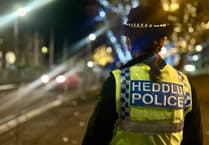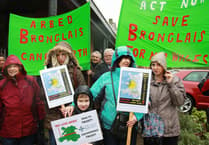Most recently, through daffodil-tinted spectacles, I deployed this column to declare our magnificent region as welcoming for minorities and the marginalised. I also described mid-Wales as ‘woke’ while noting there will always be individuals who bristle with hostility and revel in making life more difficult. Unfortunately for Black people, new figures suggest Dyfed-Powys Police, perhaps in overenthusiastically following the Home Office ‘anti-woke’ agenda, remain prime offenders in perpetuating this brand of anti-social behaviour.
But first, impressed by the wisdom of Rakie Ayola, star of The Pact (the TV series centred around a Black family living in Wales), who suggests we don’t use a word we cannot describe, let us clarify what we mean by ‘woke’.
‘Woke’, in its political context, conceived back in 1960s Black America, expressed awareness to everyday racism. Four decades later, Neo-Soul super-diva, Erykah Badu, propelled the term into broad public consciousness, declaring ‘I stay woke’ in the racially uplifting lyrics of ‘Master Teacher’. It is from this point, boosted by social media, that ‘woke’ leapt into mainstream vocabulary.
The mainstream appropriation of ‘I stay woke’ was unfortunate but predictable. Like dreadlocks and tribal tattoos, like Bob Marley songs, and like so many expressions associated with cultural identity or resistance to oppression, the concept was quickly commodified, diluted of its essence, and stripped of original meaning. ‘I stay woke’ became ‘woke’. And as the phrase changed, so disappeared the racially empowering ethos woke represented. Woke became ubiquitous. Anyone or anything could be labelled woke, a term little more than a badge to social awareness, or lack thereof.
Despite this origin in the struggle against racism, ‘woke’ has recently been co-opted by the right wing of British politics, a dog-whistle pejorative deployed to dismiss ideas of representation and inclusion. For example, aforementioned Cardiff-born Ms Ayola found herself challenged during a recent interview with, “there are some people who will see [The Pact] as a woke version of a Welsh family.” In effect demanding an explanation as to why a Welsh drama dares to reflect the experiences of Black people, while also reinforcing the unhelpful (or comforting, depending on your perspective) illusion that People of Colour do not exist here in any meaningful way. When, of course, we do.
So, when I deploy ‘woke’, I echo Erykah Badu’s expanded definition of wokeness: “Stay woke just means pay attention to what’s going on around us,” she urges. “Not to be easily swayed by the media, or by the angry mob, or by the group. Woke means critical thinking.”
Which brings us neatly back to Dyfed-Powys Police. For I paid particular attention to new statistics showing the diminutive Black population of mid Wales remains considerably more likely to be stopped and searched than our white counterparts. The perennial report again highlights the damning reality that within our otherwise hospitable region, the pockets and bags of my sons (stop and search overwhelmingly targets young males) are a bewildering eight times more likely than your sons to be rummaged through by the police.
This indefensible degree of racial disparity is higher than the UK average and far exceeds the nearest comparable force, North-Wales Police, where Black people are ‘only’ three times more likely to be stopped and searched than their white peers. And making our miserable situation worse, and unlike most other policing regions, the consistently extreme level of racial bias recorded across Dyfed-Powys has been stubbornly unwaning since recording began.
I trust that Dafydd Llywelyn, our elected Police and Crime Commissioner, is feeling utterly ashamed of data that throughout his tenure highlights stark racial injustice and a dismally un-improving picture. For clearly, and for years, there has been no consequential examination of an evidently over-zealous policing policy when it comes to police interactions with Black members of our community.
The Black folk of mid Wales are not, and never have been, a disproportionate source of crime — on the contrary. So, regardless of how appealing stop and search is to right-wing wingnuts, guessing who the criminals might be is not only a famously ineffective tool, a demonstrable waste of everyone’s time, but also deeply antagonising to those conscious (or woke) to the fact they are being singled out for unwelcome attention for no other reason than the colour of their skin.
This sense of personal violation is magnified by a history of systemic and institutional racism writ large across UK policing and throughout the broader criminal justice system. A long and well-documented context of prevalent racial prejudice that means stop and search remains a particularly humiliating and soul-sapping experience for peaceable People of Colour, especially for our young men.
And let us not overlook the unmentioned members of the community routinely intercepted by police, interrogated as though up to no good, not searched, sent on their way, unnecessarily waylaid and shaken up by the distressingly public and wholly undeserved intrusion. Doubtlessly a more common practise, doubtlessly equally racially biased, certainly enflaming, and entirely counterproductive in terms of solving crime.
Is it too difficult to imagine yourself at the sharp end of persistent discrimination? The frustration? The changes you would fight for if your children, your family, your friends, for your whole life had been unduly targeted by police just because they are dark haired, blue eyed, or Welsh?
If you can conceive such a dystopian vision, you may begin to understand how these unwarranted interventions are devastating to trust, leave a lasting impact on individuals, frighten as well as infuriate wider Black sections of our community. The truth is, under Dyfed-Powys’s heavy-handed policing, I get to worry about my boys in a way you will not.
Therefore, of further and immediate concern is the UK Government’s proposed Public Order Bill, designed to expand these powers. For increasing the use of this blunt approach combined with the dim-witted concept that alerting officers to their biases is an unwelcome product of ‘wokeism’, can only result in more below-par policing and further distrust.
So, rather than intensifying a clumsy strategy that remains stubbornly and dysfunctionally racist, the practice of negatively profiling sections of a community, if not binned altogether, needs fixing and curtailing. Police no longer relying on ethnically based guesswork, instead instructed to lean on the more fruitful strategy of gathering meaningful intelligence. The countless hours wasted bothering young Black (and white) men better directed towards pressing issues such as solving crime, pursuing effective crime prevention, and developing trust across our community. The incisive and intelligent policing that last week, after a crucial tipoff from the public, secured the convictions of three men from Manchester jailed for dealing class A drugs in Aberystwyth. More of this please.
And while it was also encouraging to note a significant prison sentence handed down to a man recently convicted of a racially aggravated assault in Aberystwyth (running disappointingly concurrently with his current prison term), this is cold comfort so long as Black men in the region remain more likely to be harassed by Dyfed-Powys Police than by members of the public.
I claimed that mid-Wales is woke, alive to social injustice, and progressive in attitude. So, Dyfed-Powys Police might begin to better reflect the local community and get ahead of the curve when it comes to providing fair and efficient policing — for my sons as well as yours. An intelligence-led culture with more balanced (and therefore effective) priorities rapidly set out by our Police and Crime Commissioner. Because Black lives do matter, even in Dyfed-Powys.
• Email: [email protected]
• Twitter: @iriesblog





Comments
This article has no comments yet. Be the first to leave a comment.